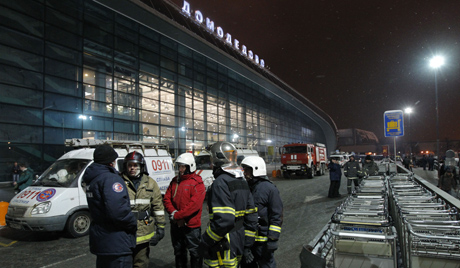
The Most Important Development in the North Caucasus in 2010: Russians Begin Talking About Letting It Go
Publication: Eurasia Daily Monitor Volume: 8 Issue: 18
By:

The most important development concerning the North Caucasus in 2010 did not occur there or even on the streets of Moscow. Rather, it took place in the minds of an increasing number of Russians who have concluded that the costs – economic, political and human – of holding the North Caucasus within the borders of the Russian Federation are too high and that consequently, Russia should “separate” the region from itself.
And while the Kremlin and the Russian government both reject such ideas as of now, Moscow has taken steps (including the creation of the North Caucasus Federal District, the elaboration of massive investment programs, and the stepping up of military efforts against the anti-Russian militants) that have had the effect of feeding this trend in Russian public opinion, leading ever more people in the country to conclude that the game in the North Caucasus is not worth the candle and that the time has come to admit as much rather than continue to pour money down into a black hole.
If there were an honest referendum in the Russian Federation (something absolutely impossible under the rule of Putin and Medvedev) many Russians, although probably fewer than half, would vote for letting the North Caucasus republics go their own way. For some analysts, that is probably enough to conclude that the “pro-independence” forces within the Russian nation are simply not important. But recent Russian history suggests that they are wrong and that this trend in Russian public opinion is critical.
There are three reasons for that conclusion. First and most important, as all too many people in Moscow and the West fail to recall, the Soviet empire died not along the periphery but at the center, when ethnic Russians decided that it was not worth fighting to hold the non-Russian republics or even concluded that Russians were spending far too much of their wealth on developing peoples who were anything but sympathetic supporters of the empire. This sentiment was far broader than the famous story about the proposal to have the RSFSR (the Russian Soviet Federative Socialist Republic) declare its independence from the USSR; it included such a large number of Russians that the demise of the Soviet Union was remarkably peaceful, something that would not have been the case had that not been true.
Second and nearly as important, the recent economic crisis in Russia has reminded everyone of the costs of supporting imperial adventures. If no one much cares about spending when incomes are going up, ever more Russians are questioning now that times are tough why they should be paying for the most violent and the most ungrateful part of the population of the Russian Federation. Throughout the Russian media and especially the blogosphere, people are asking why Chechens should get ten or twenty times more money per capita from Moscow than Russians in Ivanovo – especially when the residents of Ivanovo have sent more money to the central treasury from which the Chechen money comes.
And third, the increasing clashes between ethnic Russians and “people from the Caucasus” are forcing more and more Russians to think about how to keep the peace. Some optimists believe that the Russian Orthodox Church and the Muslim Spiritual Directorates can build new bridges, but others are less sure. Violence is mounting, not only in Moscow but across the country. And there is no sign that Russia will be able to dispense with the services of migrant laborers anytime soon.
That is another reason why independence for the North Caucasus is gaining support among the Russians: Moscow can impose rules on people who are not citizens of the Russian Federation that are very different from the rules currently governing people from the North Caucasus, who are Russian citizens. The Russian authorities have been remarkably successful in regulating migration flows from Central Asia and Azerbaijan, but they have failed utterly in the case of “persons of Caucasus nationality,” as people from the Caucasus have been popularly called in the Russian Federation since at least October 1993.
If Moscow were to let the North Caucasus go, it would not be allowing the emergence of truly independent states. The countries that would emerge would be closely tied to and even controlled by Russia, but they would be controlled as Moscow controls foreign countries near its borders, not as it tries to control people within those borders. Many Russians would be pleased to see that take place, and at least some candidates running for office in the upcoming electoral seasons there are likely to play to that.
Obviously, many Moscow officials will oppose this, either out of imperial convictions or the sense that the independence of the North Caucasus would be the first of many dominoes that would lead to the demise of the Russian Federation. That danger exists, of course, but there are two other dangers Moscow faces: if it does not grant these regions independence – even against the expressed views of their residents – Russia will experience more ethnic clashes. And if it does not dispense with these regions and the kind of force they require, Moscow will not be able to modernize and over time will fall further and further behind.
As one Russian blogger who backs getting rid of the North Caucasus put it last week, Moscow must choose between holding the Caucasus and having Russian notebook computers and smart phones. Ever more Russians clearly now feel that the latter are more worth having, and that change in attitude during 2010 is going to drive events in 2011, whatever the powers-that-be in the Kremlin want. (www.rosbalt.ru/2011/01/18/<wbr></wbr>809796.html )




